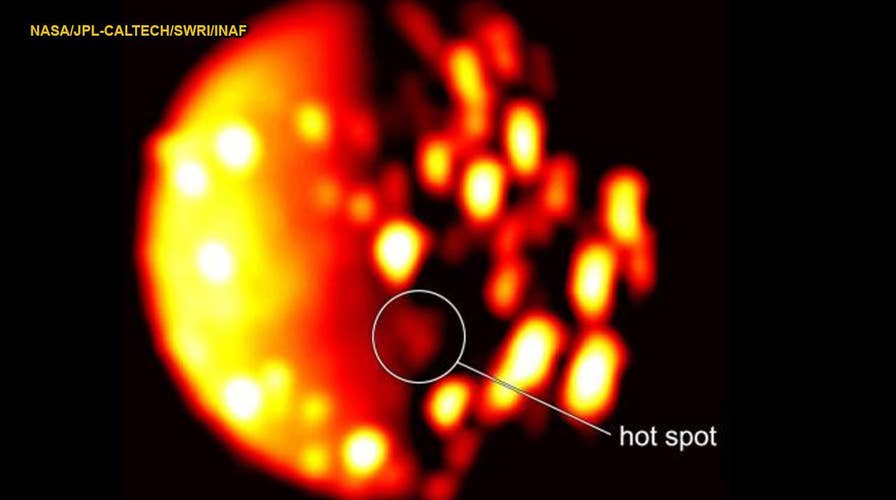NASA's Juno spacecraft captures shocking fiery images of Jupiter's moon Io
Jupiter's moon lo was once again partially illuminated with a fiery red glow in late December as a volcano erupted, spewing plumes of gases and lava. NASA's Juno spacecraft captured images of the volcanic plume during its 17th flyby of the planet. The gas giant's moon is considered the most active volcanic body in existence.
Jupiter's moon lo was once again partially illuminated with a fiery red glow in late December as a volcano erupted, spewing plumes of gases and lava.
NASA's Juno spacecraft captured images of the volcanic plume during its 17th flyby of the planet, the Southwest Research Institute recently confirmed in a news release. The gas giant's moon, which is considered the most active volcanic body in existence, was observed by researchers for more than an hour on Dec. 21 — the halfway point of Juno's years-long mission.
“We knew we were breaking new ground with a multi-spectral campaign to view Io’s polar region, but no one expected we would get so lucky as to see an active volcanic plume shooting material off the Moon’s surface,” Scott Bolton, principal investigator of the Juno mission, said in an online statement. “This is quite a New Year’s present showing us that Juno has the ability to clearly see plumes.”
MYSTERIOUS 'CREATURE' SPOTTED IN JUPITER'S CLOUDS STUNS NASA, SPACE ENTHUSIASTS
Images of the shocking sight, revealing several bright red-orange spots, were snapped by the JunoCam and shared online.

NASA's Juno spacecraft snapped photos of volcanic plumes on Jupiter's Moon lo on Dec. 21. (NASA/JPL-Caltech/SwRI/INAF)
“The ground is already in shadow, but the height of the plume allows it to reflect sunlight, much like the way mountaintops or clouds on the Earth continue to be lit after the sun has set,” Candice Hansen-Koharcheck, who operates the JunoCam from the Planetary Science Institute, described in a blog post.
NASA scientists also used instruments to measure the temperature and other data from their recent flyby.
Gathering information about Jupiter's moon is not a priority of Juno's mission — but it is an added bonus.
“Though Jupiter’s Moons are not JIRAM’s primary objectives, every time we pass close enough to one of them, we take advantage of the opportunity for an observation,” Alberto Adriani, a researcher at Italy’s National Institute of Astrophysics, told the Southwest Research Institute. “The instrument is sensitive to infrared wavelengths, which are perfect to study the volcanism of Io. This is one of the best images of Io that JIRAM has been able to collect so far.”
'CREATURES' IN JUPITER'S CLOUDS? NASA'S JUNO SPACECRAFT CAPTURES IMAGES THAT STUN THE INTERNET
NASA's Juno spacecraft launched on Aug. 5, 2011 and arrived at Jupiter five years later, in July 2016. Juno's mission is slated to come to a close in July 2021 after the spacecraft slowly orbits Jupiter, collecting important data along the way.

Jupiter's Moon lo is reportedly the most active volcanic body in existence. (NASA/JPL-Caltech/SwRI/INAF)
"Juno's principal goal is to understand the origin and evolution of Jupiter. Underneath its dense cloud cover, Jupiter safeguards secrets to the fundamental processes and conditions that governed our solar system during its formation. As our primary example of a giant planet, Jupiter can also provide critical knowledge for understanding the planetary systems being discovered around other stars," NASA describes on its website.
As the spacecraft explores the fifth planet from the Sun, it has taken some impressive pictures along the way. The colorful clouds of Jupiter, in particular, have captivated space enthusiasts as they spot familiar shape among the mesmerizing swirls.
Fox News' Chris Ciaccia contributed to this report.
